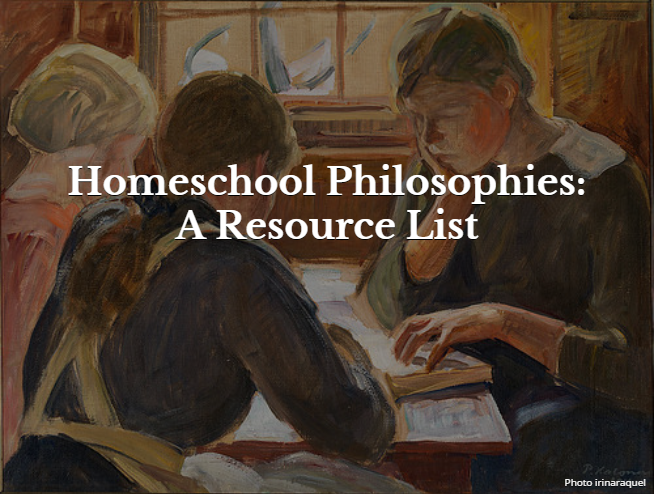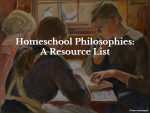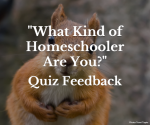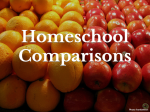 Many people who took the What Kind of Homeschooler Are You? quiz have asked for more information about some of the different homeschool philosophies. As a result, I put together this resource list that briefly describes each philosophy and gives you links to find out more information.
Many people who took the What Kind of Homeschooler Are You? quiz have asked for more information about some of the different homeschool philosophies. As a result, I put together this resource list that briefly describes each philosophy and gives you links to find out more information.
Classical
Approach
Classical Education is based on the trivium which consists of three stages of learning. In the earlier elementary years, the focus is on the learning and memorization of facts. The logic stage begins in late elementary and goes through middle school. During this stage the emphasis is on learning to think and analyzing information. In high school, the rhetoric stage of classical education involves the child learning to effectively communicate thoughts and ideas with others.
Books on Classical Education
The Core: Teaching Your Child the Foundations of Classical Education
Simply Classical: A Beautiful Education for Any Child
Websites on Classical Education
Blogs on Classical Education at Home
Classical Education Curriculum
The Ordinary Parent’s Guide to Teaching Reading
Waldorf
Approach
Waldorf Education was developed by Rudolf Steiner in the early 1900s. The approach values nature, creative expression, cooperation, play-based learning, and social responsibility. It involves three stages of development. The first stage is from birth through age 7. During that stage there is no direct teaching and an emphasis on creative play and experiencing the world. From age 7 through age 14 lessons are approached through art. From age 14 to the end of high school, the approach is rigorous with a focus on learning to think for oneself.
Books on Waldorf Education
Understanding Waldorf Education
Waldorf Education: A Family Guide
The Waldorf Homeschool Handbook
Websites on Waldorf Education
Christopherus Homeschool Resources
Blogs on Waldorf Home Education
Waldorf Education Curriculum
Oak Meadow (not completely Waldorf)
Traditional (School at Home) Approach
Approach
The traditional approach to homeschooling parallels a typical classroom. Grade level textbooks, workbooks, and teacher’s manuals are used. Tests, grades, and schedules are a normal part of traditional schooling. Many families using this approach will have a mini-classroom set up in their home.
Blogs on Traditional Education
Traditional Education Curriculum
Unschooling
Approach
Unschooling is child-led learning. Believers in this philosophy feel that leaning is natural for children and when children lead the way, learning is meaningful for the child. Parents provide support and act as facilitators rather than teachers.
Books on Unschooling
Sandra Dodd’s Big Book of Unschooling
Teach Your Own: The John Holt Book of Home Schooling
Websites on Unschooling
Sandra Dodd Radical Unschooling
Blogs on Unschooling
I’m Unschooled. Yes, I Can Write.
Stories of an Unschooling Family
Thomas Jefferson Education
Approach
Also called Leadership Education, Thomas Jefferson Education has a goal of raising future leaders. The child progresses through different phases of learning. From birth to age 8, the child learns about morals, family values, relationships, the value of work, and responsibilities. Between ages 8 through 12, the focus is on helping the child develop a love for learning. The child enjoys read alouds, projects, and interest led learning during that time. The next phase is between 12 to 18 years. During this time the child studies classics, utilizes mentors, and spends long hours in study.
Books on Thomas Jefferson Education
A Thomas Jefferson Education Home Companion
Thomas Jefferson Education for Teens
Websites on Thomas Jefferson Education
Blogs on Thomas Jefferson Education
Montessori
Approach
Montessori education began with Maria Montessori in the early 1900s. With this method, the parent acts as an observer or guide as the child spends long periods of uninterrupted child-led study. The environment is set up to provide a place for the child to freely explore. Subjects are explored in an interrelated way rather than separated into different areas of study.
Books on Montessori Education
Teaching Montessori in the Home: Pre-School Years
Teaching Montessori in the Home: School Years
Websites on Montessori Education
Blogs on Montessori Home Education
Confessions of a Montessori Mom
Montessori Curriculum
NAMC 3-6 Montessori Homeschool Program
Charlotte Mason Education
Approach
The Charlotte Mason approach to education focuses on educating the whole child and not just the mind. Charlotte Mason believed in the importance of establishing good habits. Shorter lessons with focused attention are preferred over longer blocks of time. Understanding ideas is prioritized over learning facts. Living books, spending time outside, literature-rich studies, art and music studies, and narration are elements you would find in a Charlotte Mason homeschool.
Books on Charlotte Mason Education
Home Education by Charlotte Mason
More Charlotte Mason Education: A Homeschooling How-To Manual
Websites on Charlotte Mason Education
Blogs on Charlotte Mason Education
Charlotte Mason Education Curriculum
Unit Studies
Approach
Unit studies are topical studies that combine many different subjects. Often projects or activities are incorporated into the study. Many unit studies can be adapted so they can be used with a wide age range. Some families do notebooking or lapbooking as part of their studies.
Books on Using Unit Studies
Science Unit Studies for Homeschoolers or Teachers
How to Create Your Own Unit Study
Blogs on Unit Studies
Tina’s Dynamic Homeschool Plus
Unit Study Curriculum
Of course there is always Eclectic. Most homeschoolers are at least a little eclectic. Eclectic homeschooling means that a variety of philosophies and methods are used to come up with a unique mix that works for your family. If you notice the title of this blog, we are eclectic and identify with many elements from the various philosophies. At the same time, there is no one particular method that stands out as something that will be the best fit for our family. I highly value personalized learning and find that eclectic homeschooling best allows me to do that.
What method do you identify with the most?







Thank you for including The Natural Homeschool on the list! <3
I follow a Classical method using Memoria Press, which is similar to The Latin Centered Curriculum…I find that the methods and philosphy used by Memoria Press is not the same as Well Trained Mind…There seems to be two different types of Classical Educators…The definition above is a good description of those who use The Well Trained Mind which is more neoclassical, but differs from those who use a Latin centered approach…
Thanks for that clarification.